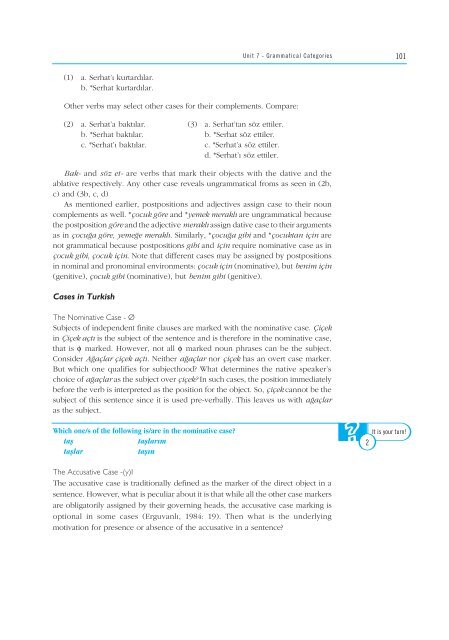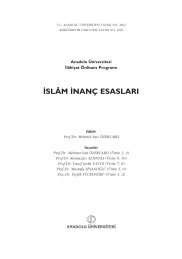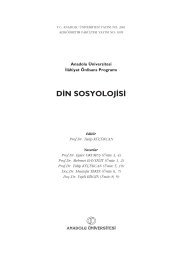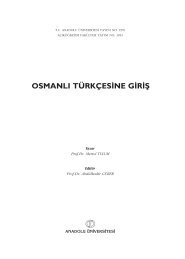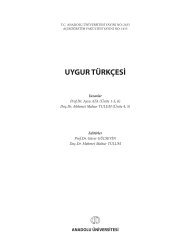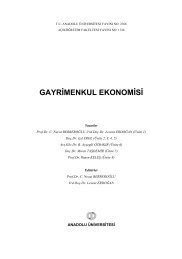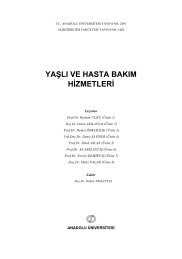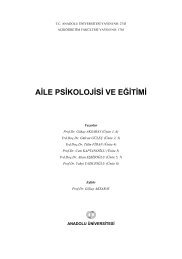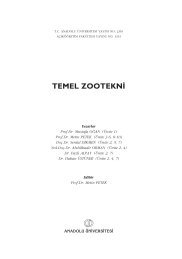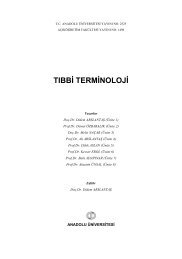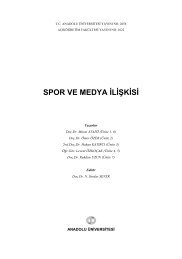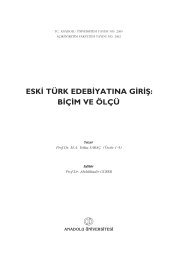turkish phonology and morphology (türkçe ses ve b‹ç‹mb‹lg‹s‹)
turkish phonology and morphology (türkçe ses ve b‹ç‹mb‹lg‹s‹)
turkish phonology and morphology (türkçe ses ve b‹ç‹mb‹lg‹s‹)
You also want an ePaper? Increase the reach of your titles
YUMPU automatically turns print PDFs into web optimized ePapers that Google loves.
(1) a. Serhat’› kurtard›lar.<br />
b. *Serhat kurtard›lar.<br />
Other <strong>ve</strong>rbs may select other ca<strong>ses</strong> for their complements. Compare:<br />
(2) a. Serhat’a bakt›lar. (3) a. Serhat’tan söz ettiler.<br />
b. *Serhat bakt›lar. b. *Serhat söz ettiler.<br />
c. *Serhat’› bakt›lar. c. *Serhat’a söz ettiler.<br />
d. *Serhat’› söz ettiler.<br />
Bak- <strong>and</strong> söz et- are <strong>ve</strong>rbs that mark their objects with the dati<strong>ve</strong> <strong>and</strong> the<br />
ablati<strong>ve</strong> respecti<strong>ve</strong>ly. Any other case re<strong>ve</strong>als ungrammatical froms as seen in (2b,<br />
c) <strong>and</strong> (3b, c, d)<br />
As mentioned earlier, postpositions <strong>and</strong> adjecti<strong>ve</strong>s assign case to their noun<br />
complements as well. *çocuk göre <strong>and</strong> *yemek merakl› are ungrammatical because<br />
the postposition göre <strong>and</strong> the adjecti<strong>ve</strong> merakl› assign dati<strong>ve</strong> case to their arguments<br />
as in çocu¤a göre, yeme¤e merakl›. Similarly, *çocu¤a gibi <strong>and</strong> *çocuktan için are<br />
not grammatical because postpositions gibi <strong>and</strong> için require nominati<strong>ve</strong> case as in<br />
çocuk gibi, çocuk için. Note that different ca<strong>ses</strong> may be assigned by postpositions<br />
in nominal <strong>and</strong> pronominal environments: çocuk için (nominati<strong>ve</strong>), but benim için<br />
(geniti<strong>ve</strong>), çocuk gibi (nominati<strong>ve</strong>), but benim gibi (geniti<strong>ve</strong>).<br />
Ca<strong>ses</strong> in Turkish<br />
The Nominati<strong>ve</strong> Case - Ø<br />
Subjects of independent finite clau<strong>ses</strong> are marked with the nominati<strong>ve</strong> case. Çiçek<br />
in Çiçek açt› is the subject of the sentence <strong>and</strong> is therefore in the nominati<strong>ve</strong> case,<br />
that is φ marked. Howe<strong>ve</strong>r, not all φ marked noun phra<strong>ses</strong> can be the subject.<br />
Consider A¤açlar çiçek açt›. Neither a¤açlar nor çiçek has an o<strong>ve</strong>rt case marker.<br />
But which one qualifies for subjecthood? What determines the nati<strong>ve</strong> speaker’s<br />
choice of a¤açlar as the subject o<strong>ve</strong>r çiçek? In such ca<strong>ses</strong>, the position immediately<br />
before the <strong>ve</strong>rb is interpreted as the position for the object. So, çiçek cannot be the<br />
subject of this sentence since it is used pre-<strong>ve</strong>rbally. This lea<strong>ve</strong>s It is your us turn! with a¤açlar<br />
as the subject.<br />
1 1<br />
Which one/s of the following is/are in the nominati<strong>ve</strong> case?<br />
tafl tafllar›m<br />
tafllar tafl›n<br />
Unit 7 - Grammatical Categories<br />
It is your turn!<br />
The Accusati<strong>ve</strong> Case -(y)I<br />
3<br />
The accusati<strong>ve</strong> case is traditionally defined as the marker of the direct object in a<br />
It is your turn!<br />
3<br />
sentence. Howe<strong>ve</strong>r, what is peculiar about it is that while all the other case markers<br />
It is your turn!<br />
are obligatorily assigned by their go<strong>ve</strong>rning heads, the accusati<strong>ve</strong> case marking is<br />
4<br />
optional in some ca<strong>ses</strong> (Erguvanl›, 1984: 19). Then what is the underlying<br />
It is your turn!<br />
4<br />
motivation for presence or absence of the accusati<strong>ve</strong> in a sentence?<br />
It is your turn!<br />
It is your turn!<br />
5 5<br />
101<br />
It is your turn!<br />
It is your turn!<br />
It is your turn!<br />
2 2<br />
It is your turn!<br />
It is your turn!<br />
6 6<br />
It is your turn!<br />
It is your turn!<br />
7 7<br />
It is your turn! It is your turn!


